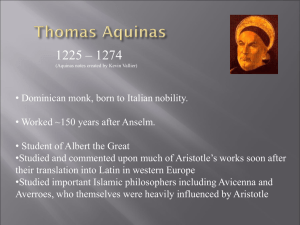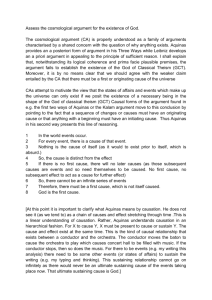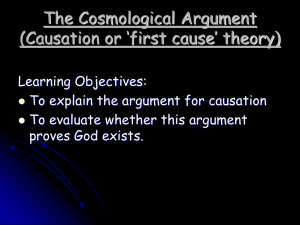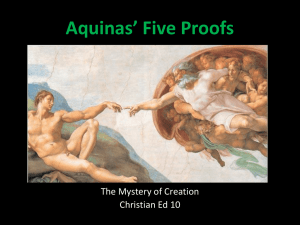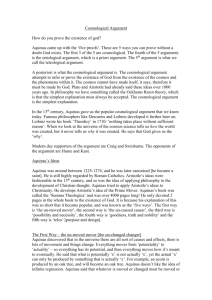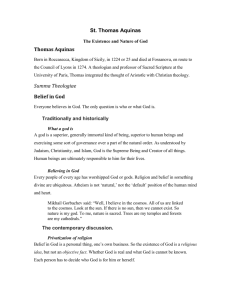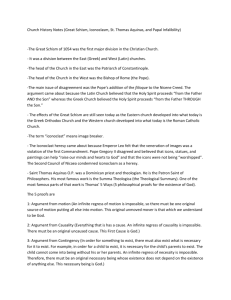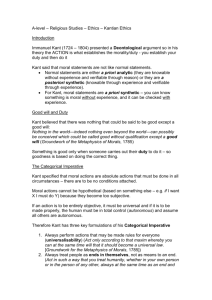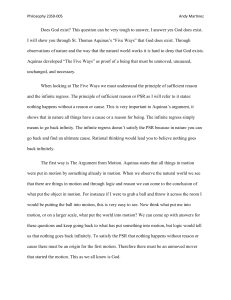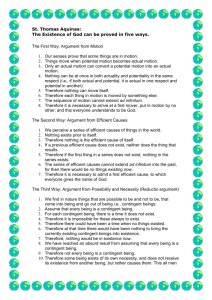Traditional Arguments Lesson Two – The Cosmological Argument
advertisement
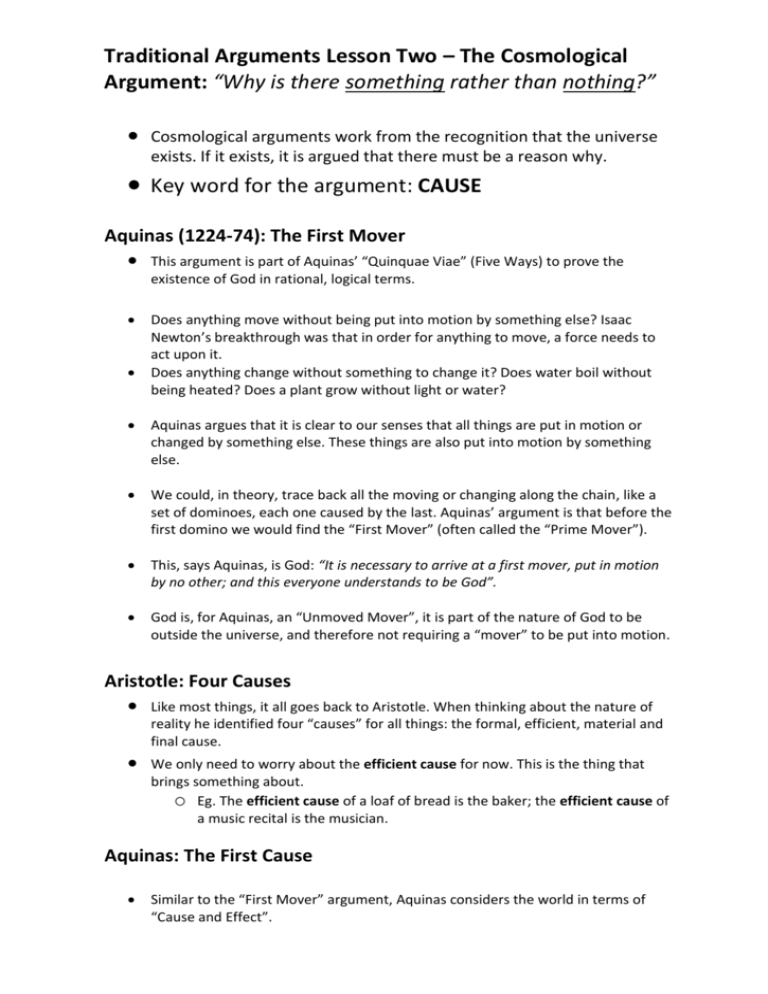
Traditional Arguments Lesson Two – The Cosmological Argument: “Why is there something rather than nothing?” Cosmological arguments work from the recognition that the universe exists. If it exists, it is argued that there must be a reason why. Key word for the argument: CAUSE Aquinas (1224-74): The First Mover This argument is part of Aquinas’ “Quinquae Viae” (Five Ways) to prove the existence of God in rational, logical terms. Does anything move without being put into motion by something else? Isaac Newton’s breakthrough was that in order for anything to move, a force needs to act upon it. Does anything change without something to change it? Does water boil without being heated? Does a plant grow without light or water? Aquinas argues that it is clear to our senses that all things are put in motion or changed by something else. These things are also put into motion by something else. We could, in theory, trace back all the moving or changing along the chain, like a set of dominoes, each one caused by the last. Aquinas’ argument is that before the first domino we would find the “First Mover” (often called the “Prime Mover”). This, says Aquinas, is God: “It is necessary to arrive at a first mover, put in motion by no other; and this everyone understands to be God”. God is, for Aquinas, an “Unmoved Mover”, it is part of the nature of God to be outside the universe, and therefore not requiring a “mover” to be put into motion. Aristotle: Four Causes Like most things, it all goes back to Aristotle. When thinking about the nature of reality he identified four “causes” for all things: the formal, efficient, material and final cause. We only need to worry about the efficient cause for now. This is the thing that brings something about. o Eg. The efficient cause of a loaf of bread is the baker; the efficient cause of a music recital is the musician. Aquinas: The First Cause Similar to the “First Mover” argument, Aquinas considers the world in terms of “Cause and Effect”. Everything we see in the universe has an efficient cause. Human beings have efficient causes (their parents) too. It follows that the efficient causes must have their own efficient cause. Our parents have an efficient cause in their grandparents. Aquinas argues that, in theory we could follow the chain of cause and effect back all the way. At the beginning we would find a “First Cause”: God. God is, again, outside of the universe as we know it and can therefore be understood to be an “Uncaused Cause”. God does not require a cause by nature. Aquinas: Contingent and Necessary Beings A third argument given by Aquinas is that of contingency. He argues that all things in the universe are contingent on other things. That means that everything we see relies, in some way, on other things in order to exist. o A fire is contingent on its fuel, humans are contingent on their parents. Increasingly we are finding that complex ecosystems have complex relationships in which many things are contingent upon each other. The argument goes that if everything was a contingent being (reliant on something else) then nothing would ever have come into existence at all. There must therefore be a necessary being, which exists without being contingent on anything else. This necessary being enables contingent beings to exist and is known to everyone else as: God. As before, being outside of the normal realm of things it is possible for God to exist as a necessary being, not continent on anything else. The Kalam Argument: Islamic Influence Muslim scholars were big fans of Aristotle and also used his ideas to back up their belief in God. Particular names to note: al-Kindi and al-Ghazali. The big contribution was in dealing with the problem of infinite regress Some have argued that there is no reason, in principle, why the chains of cause and effect identified by Aristotle cannot go back ad infinitum. If there is an infinite regress then there is no need for a “God” to cause everything in the first place. Kalam scholars argued that “infinity” is a useful mathematical concept, but it cannot exist within the real universe. Suppose there were an infinite number of days before today. If this were the case we would never have arrived at today, because to do so would mean that in fact there were only a finite number of days before today. However, here we are. Today. There cannot have been an infinite number of days before today. Similarly, it is not possible to have an infinite number of anything. It simply doesn’t make any sense of the world we see. Therefore, rather than infinite regress there must be a finite number of links in the chain of cause and effect which brings us back to the need for a First Cause. Leibniz (1646-1716): Sufficient Reason Leibniz took a different tack in getting around the problem of infinite regress. He argued that everything must have a sufficient reason. We may not know how or why things happen, but Leibniz argued that there must be a reason all the same. Therefore, even if the universe has always existed, we still require a sufficient reason to explain why it exists at all. Thus for the universe to exist in any shape or form there must be something behind it. It does not give a sufficient reason to argue that “the universe has always existed therefore it requires no cause or creator”. The Cosmological Argument


